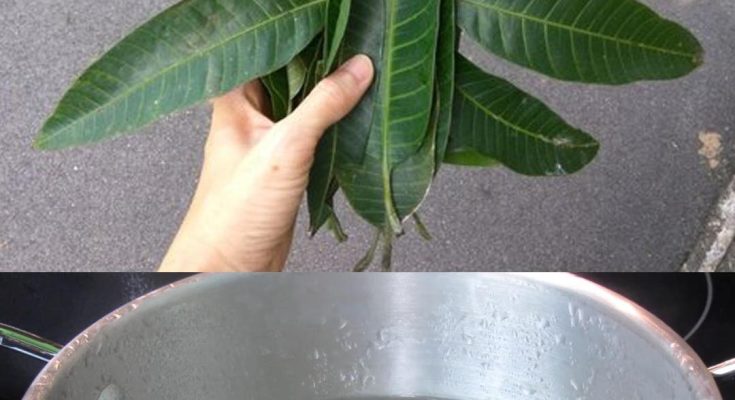Mango leaves are often overshadowed by the sweet and juicy fruit they accompany, but these vibrant green leaves have been a staple in traditional medicine for centuries. In many parts of the world, particularly in Asia, mango leaves are considered potent remedies for numerous health conditions. From regulating blood sugar levels to promoting skin health, the benefits of these leaves are far-reaching. In this article, we will delve into 30 incredible benefits of mango leaves and explore how they can be used in simple homemade remedies.
30 Benefits of Mango Leaves
- Rich in Antioxidants: Mango leaves contain polyphenols, which act as antioxidants, neutralizing harmful free radicals in the body.
- Supports Heart Health: The leaves have the ability to reduce blood pressure and help strengthen the heart.
- Regulates Blood Sugar: Known for their anti-diabetic properties, mango leaves can help manage insulin production and balance blood sugar levels.
- Improves Digestive Health: Mango leaves aid in digestion and relieve digestive disorders like diarrhea and stomach cramps.
- Lowers Cholesterol: Regular consumption of mango leaf tea may help lower harmful cholesterol levels.
- Promotes Respiratory Health: These leaves can help alleviate asthma, bronchitis, and other respiratory issues.
- Helps with Weight Loss: The fiber content in mango leaves helps boost metabolism and may assist in weight management.
- Anti-Inflammatory: The anti-inflammatory properties reduce pain and inflammation, benefiting conditions like arthritis.
- Improves Skin Health: Mango leaves are often used to treat burns, cuts, and skin irritations.
- Prevents Fatigue: Rich in natural energy-boosting compounds, mango leaves combat fatigue and exhaustion.
- Soothes Anxiety: The calming properties of mango leaves may help reduce anxiety and mental tension.
- Detoxifies the Body: Mango leaves are known to aid the body in detoxifying, particularly the kidneys and liver.
- Promotes Hair Growth: Regular use of mango leaves in hair treatments strengthens hair and promotes growth.
- Reduces Acne: The antimicrobial properties help treat acne and other skin conditions.
- Boosts Immune System: The high vitamin C content in mango leaves strengthens the immune system.
- Treats Hypertension: Drinking mango leaf tea can help manage high blood pressure levels.
- Reduces Menstrual Cramps: The leaves contain natural pain-relieving compounds that ease menstrual discomfort.
- Anti-Aging Benefits: The antioxidants help fight the signs of aging, keeping the skin youthful and radiant.
- Improves Vision: Rich in vitamin A, mango leaves contribute to better eye health and vision.
- Treats Ear Infections: Mango leaf juice can be used as a natural remedy for ear infections.
- Enhances Cognitive Function: The compounds in mango leaves may help improve memory and cognitive abilities.
- Combats Insomnia: Consuming mango leaf tea can help induce sleep and treat insomnia.
- Supports Bone Health: The calcium content in mango leaves helps maintain strong bones.
- Treats Gout: The anti-inflammatory properties make mango leaves beneficial for people suffering from gout.
- Prevents Kidney Stones: Mango leaves can help dissolve kidney stones and improve kidney function.
- Aids in Ulcer Treatment: Drinking mango leaf tea is known to provide relief from stomach ulcers.
- Prevents Obesity: The leaves help in reducing body fat and preventing obesity-related complications.
- Fights Fungal Infections: Mango leaves are effective in treating fungal infections due to their antifungal properties.
- Balances Acidity: They help neutralize the body’s acidity and promote a healthy pH balance.
- Treats Diarrhea: The tannins in mango leaves provide relief from diarrhea and other gastrointestinal problems.
Homemade Uses of Mango Leaves
- Mango Leaf Tea: One of the most common ways to use mango leaves is by brewing them into a tea. Simply boil fresh or dried mango leaves in water for 10–15 minutes. Strain the mixture and drink the tea to benefit from its antioxidant, anti-diabetic, and heart-health properties.
- Mango Leaf Infusion for Skin: To use mango leaves for skin problems like burns, infections, or irritations, you can prepare an infusion by boiling the leaves and letting the water cool. Apply the cooled liquid to the affected areas with a cotton ball.
- Hair Growth Treatment: Mango leaves can be used to strengthen hair and stimulate growth. Crush fresh mango leaves, mix them with coconut oil, and apply the mixture to your scalp. Leave it for about 30 minutes before washing it off.
- Ear Infection Remedy: For ear infections, warm up some mango leaf juice (extracted by crushing the leaves) and apply a few drops in the infected ear for relief.
- Anxiety-Relief Bath: Adding a few mango leaves to your bathwater can have a calming effect and reduce anxiety and stress.
- Anti-Inflammatory Compress: If you’re experiencing pain or inflammation, use a compress made from boiled mango leaves to reduce discomfort.
Mango leaves, though often overlooked, offer a plethora of health benefits and can easily be incorporated into your daily routine. From teas to topical treatments, their versatility and natural properties make them a powerful addition to home remedies. Whether you’re aiming to improve your heart health, regulate blood sugar, or simply boost your overall well-being, mango leaves are a natural solution worth exploring.
Disclaimer
While mango leaves provide numerous health benefits, it’s important to consult with a healthcare professional before incorporating them into your routine, especially if you have underlying health conditions or are taking medications. In rare cases, excessive consumption of mango leaves may cause allergic reactions or digestive issues. Always use them in moderation to avoid any potential health risks.



